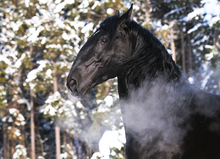According to Katie Young, Equine Nutritionist, Ph.D., Purina Animal Nutrition, proper care and nutrition, especially during the winter months, can go a long way in keeping senior horses healthy long term.

Winterize your horse
Proper care and nutrition, especially during the winter months, can go a long way in keeping senior horses healthy long term.
It is important that senior horses come into winter with a healthy body condition. Additional body fat serves as insulation and energy reserves in times when temperatures become frigid. Once cold weather sets in, it is difficult to put weight on senior horses.
Thin horses get colder and use so much energy trying to stay warm, that there aren't enough calories left for weight gain.
Equine Senior® contains enough roughage and added fat to ensure the older horse can meet its fiber and calorie requirements without depending on long-stemmed hay or grass. Although active and energetic senior horses may seem less vulnerable to winter weather conditions, their diets still need additional attention in winter months.
Purina® Equine Senior® Active Healthy Edge® horse feed is formulated to maintain body condition for more active senior horses by providing high fat and< fiber with a controlled starch and sugar formula that delivers all the vitamins and minerals needed to stay fit and active.
Consistent intake of water is very important for a healthy senior horse. Water should always be readily available to horses. Ideally, the water temperature should be between 45 degrees and 65 degrees Fahrenheit. If the water is too cold, the senior horse may not drink enough to stay hydrated and healthy.
Other tips for keeping your horses healthy include:
- Gradually increase forage as grazing becomes less available. Forage in the form of good-quality hay will also provide additional warmth to your horse as it is digested.
- Grass in the cool fall mornings (especially after a frost) is high in water-soluble sugars and puts some horses at risk for founder.
- Horses should drink 6-10 gallons per day, and the more hay they eat, the more water they need to drink.
- Most horses prefer water between 45-65oF, so you may need a tank heater on colder days.
- If your horse decreases water consumption, adding table salt (1-2 tablespoons) to your horse’s grain may encourage water
- If you plan to ride your horse, double your warm-up time to avoid injuries to tendons and muscles and cool your horse down properly after riding.
- Don’t forget that some medications, shampoos and ointments may freeze if left in an uninsulated tack room or trailer.
